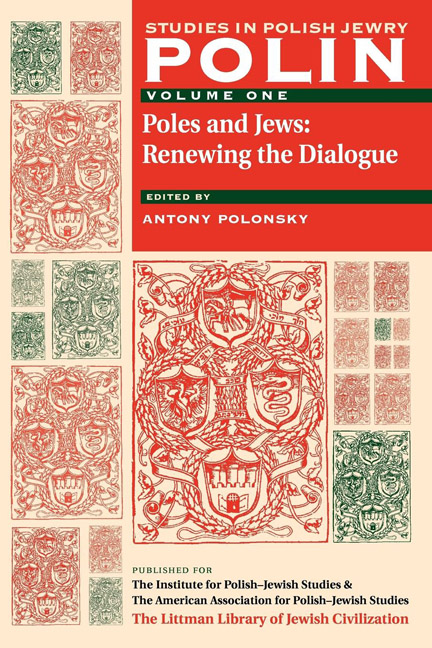Book contents
- Frontmatter
- Dedication
- Editors and Advisers
- Contents
- Polin
- Statement From the Editors
- ARTICLES
- DOCUMENTS
- INTERVIEW
- A DIALOGUE
- BIBLIOGRAPHICAL ESSAYS
- The Jewish Community of the Second Republic in Polish Historiography of the 1980s
- The Western Allies and the Holocaust
- Five Wartime Testimonies
- Ashkenazicjewry and Catastrophe
- BOOK REVIEWS
- CONTRIBUTORS
The Jewish Community of the Second Republic in Polish Historiography of the 1980s
from BIBLIOGRAPHICAL ESSAYS
- Frontmatter
- Dedication
- Editors and Advisers
- Contents
- Polin
- Statement From the Editors
- ARTICLES
- DOCUMENTS
- INTERVIEW
- A DIALOGUE
- BIBLIOGRAPHICAL ESSAYS
- The Jewish Community of the Second Republic in Polish Historiography of the 1980s
- The Western Allies and the Holocaust
- Five Wartime Testimonies
- Ashkenazicjewry and Catastrophe
- BOOK REVIEWS
- CONTRIBUTORS
Summary
The national minorities made up over 30 per cent of Poland's population in the inter-war period. This was not exceptional in Central Europe, where practically all countries included a substantial percentage of minorities; the Soviet Union, Yugoslavia, and Czechoslovakia were even.less uniform from the national or linguistic point of view.
The problem of the ethnic minorities in the Second Republic - their socio-economic situation, their role in the political and cultural life of the country, their relations with the state - is one of the most neglected fields of post-war Polish historiography. The situation improved only slightly in the 1970s, minimally as regards the Jewish question; in Poland this still remains the domain of highly specialized publications (mainly the Bulletin of the Jewish Historical Institute) which do not reach the general reader.
To be sure, the authors of synthetic or monographic studies concerning the history of the Second Republic have been unable totally to ignore the problem of the nationalities, although their approaches often give rise to reservations. For instance, when Andrzej Ajnenkiel published in 1980 the second volume of his political history of Poland (this one covering the period between 1926-1939) national minorities were treated sparingly. In describing the results of the 1931 census, the author briefly discusses the size and socio-professional structure of the Jewish population and the rising influence of the Zionist movement in the second half of the 1930s. Elsewhere, the Jewish population appears almost exclusively as the object of anti-semitic propaganda and pogroms organized by nationalists of both Polish or, more rarely, Ukrainian camps. Ajnenkiel provides economic explanations for national tensions:
[The Jews] who traditionally did not engage in farming, and for generations remained engaged in trade and in certain branches of production … [in the 1930s] encountered sharp competition in these very fields. They also faced rivalry in those professions and industries they could dominate because of their greater average prosperity and consequent greater educational opportunities. The crisis of capitalist economy was reflected in growing nationalism and in anti-semitism described by August Behel as the Socialism of Fools (p. 263).
Anti-semitism is examined more extensively by Henryk Zieliński,who draws attention to the way in which Polish-Jewish economic competition was accompanied by ‘animosity over customs, religion and the acknowledgement of different value systems’ (p. 318).
- Type
- Chapter
- Information
- Poles and Jews: Renewing the Dialogue , pp. 288 - 299Publisher: Liverpool University PressPrint publication year: 2004



